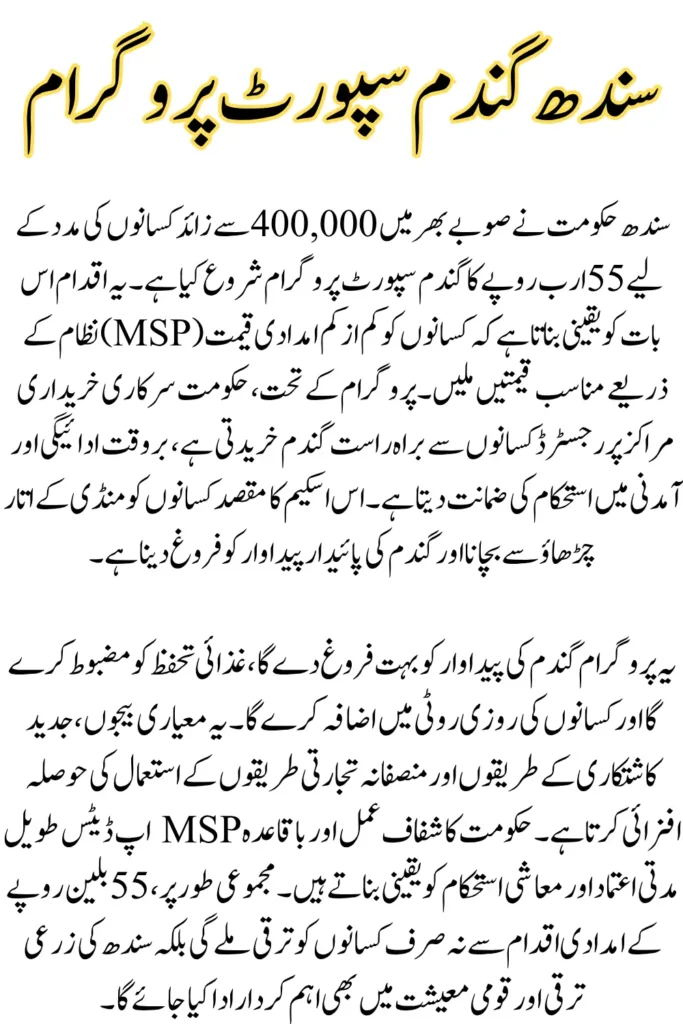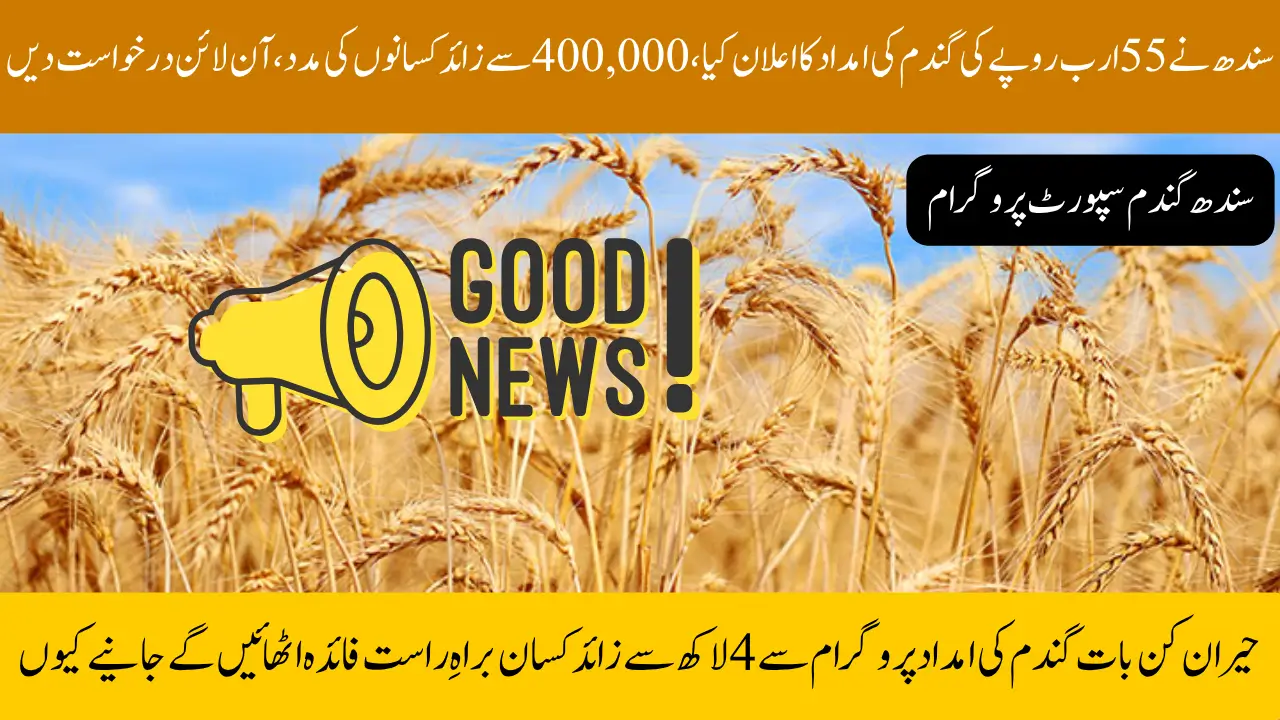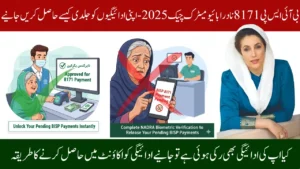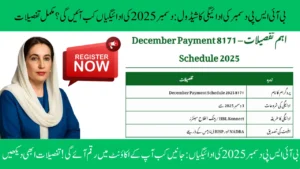Sindh Announces Rs 55 Billion Wheat Support
The Wheat Support Program helps farmers get fair prices for their wheat. Under this scheme, the government buys wheat at a minimum support price. This ensures farmers earn profits and are protected from market fluctuations. Farmers can sell their wheat directly to government procurement centers. The program also provides timely payments to support their cash flow.

This program boosts wheat production and strengthens food security. It encourages farmers to grow quality wheat and reduces financial risks. The government regularly updates MSP rates to match market conditions. Farmers benefit from transparent processes and easy access to information. Overall, the Wheat Support Program safeguards farmers’ income and promotes sustainable agriculture.
Eligibility Criteria for Farmers
Farmers must meet certain rules to benefit from the Wheat Support Program. The program supports both small and large farmers. They must follow government guidelines for wheat cultivation and sale.
Key Eligibility Points:
- Must be a registered farmer.
- Own or lease land suitable for wheat cultivation.
- Follow government-approved farming practices.
- Sell wheat through authorized procurement centers.
- Keep proper records for verification.
Only registered and compliant farmers can access the Wheat Support Program.
Implementation Plan
The government implements the Wheat Support Program in clear and structured steps. It ensures that farmers get fair prices and timely payments. The plan involves coordination between state agencies, procurement centers, and farmers.
Key Implementation Steps:
- Set up wheat procurement centers in all major farming areas.
- Announce and display the Minimum Support Price (MSP).
- Register eligible farmers before procurement starts.
- Monitor wheat quality and storage conditions.
- Ensure transparent and quick payment to farmers.
The plan ensures smooth wheat procurement and fair benefits for every registered farmer.
Expected Impact on Agriculture and Economy
The Wheat Support Program will boost both farming and the national economy. It encourages farmers to grow more wheat by ensuring fair prices and steady income. With government support, farmers can invest in better seeds and technology, leading to higher yields.
Main Impacts:
- Increases wheat production and food security.
- Improves farmers’ income and living standards.
- Creates more jobs in rural areas.
- Strengthens the agriculture supply chain.
- Boosts national economic growth through stable grain markets.
The program promotes strong agricultural growth and supports a stable, growing economy.
You Can Also Read: CNIC Verification Through NADRA : Check Your ID Card Status Online Easily
Government Statements
The government has highlighted the Wheat Support Program as a key step toward farmer welfare and food security. Officials stated that the program ensures fair prices and protects farmers from market risks. They confirmed that the government will continue to raise the Minimum Support Price when needed to match production costs.
Key Points from Government Statements:
- The program aims to secure farmers’ income.
- MSP will reflect real farming expenses.
- Transparent procurement benefits every registered farmer.
- The policy supports long-term agricultural stability.
- The government will monitor and improve the scheme regularly.
The government reaffirms its commitment to farmer welfare and a strong, secure agriculture sector.
You Can Also Read: Honhaar Scholarship 2025 Last Date Announced – Check Eligibility & Apply Online Today
Challenges and Concerns
The Wheat Support Program faces some key challenges that affect its success. Many farmers still lack awareness about registration and MSP procedures. Delays in payment and limited storage capacity also create problems. Transportation and quality control issues can reduce farmers’ profits and satisfaction.
Main Challenges:
- Low awareness among small and marginal farmers.
- Delays in payments and procurement processes.
- Inadeuate storage and logistics facilities.
- Uneven access to government centers.
- Difficulty in maintaining wheat quality standards.
The program needs stronger management and better farmer awareness to achieve full success.
You Can Also Read: Gold Price In Pakistan Today: Impact of Dollar, Global Markets & Local Demand
Conclusion
The Wheat Support Program plays a vital role in improving farmers’ income and ensuring food security. It provides fair prices, protects farmers from market risks, and motivates them to produce more wheat. By ensuring timely payments and transparent processes, the program builds farmers’ trust in government support systems.
Overall, this initiative strengthens the agricultural sector and supports rural development. With better awareness, improved infrastructure, and continuous monitoring, the program can achieve greater success. The Wheat Support Program not only benefits farmers but also contributes to the nation’s economic growth and long-term food stability.
You Can Also Read: Punjab Tourism Internship 2025 – Paid Internship Opportunity with 60K Stipend
Frequently Asked Questions
What is the Wheat Support Program?
The Wheat Support Program is a government scheme that ensures farmers get fair prices for their wheat through the Minimum Support Price system.
Who can apply for the Wheat Support Program?
All registered farmers who grow wheat and follow government farming guidelines can apply for the program.
How does the government buy wheat from farmers?
Farmers sell their wheat directly to authorized procurement centers at the announced MSP rate during the procurement season.
When do farmers receive payment under the Wheat Support Program?
Farmers usually receive their payments within a few days after the government procures their wheat.
What are the main benefits of the Wheat Support Program?
The program provides fair prices, financial security, and encourages more wheat production, helping to boost the agricultural economy.
You Can Also Read: Punjab Tourism Internship 2025 – Paid Internship Opportunity with 60K Stipend









